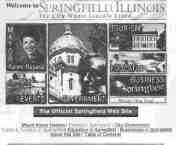
|
Internet Access Could Lead To Uncharted Territory
By Al Manning
Al Manning wrote a political column for the State Journal-Register in Springfield and as Director of Communications for the Illinois Attorney General's Office dealt regularly with Freedom of Information questions. He now operates a public relations firm in Evanston.
|
As municipal governments increasingly use the Internet to communicate with their residents, they must recognize the vast amount of information available may well lead to uncharted questions focusing on the definition of public information.
Most municipal governments across the state enjoy a good working relationship with their local news media. Although there are occasional differences of opinion about compliance with the Open Meetings Act and some disputes about the availability of police records, by and large government officials and the news media reach accommodation under the Freedom of Information Act.
Of course, information is available to the public as well as the news media, but in most instances - unless a vigorous dispute arises - the public is content to let the reporters dig out the information for them.
With the Internet, through, a sophisticated computer user sitting at home soon may be able to retrieve more information about a municipality than any beat reporter ever dreamed was available, So municipalities that are preparing to go on-line - and that should be about every city of any size - should be thinking about the types of information they intend to make public.
For example, in the March issue of this magazine, the Village of Tinley Park had a most interesting article about the advantages of the World Wide Web and how their homepage intends to offer services such as registration for building permits. Without question, more and more municipalities should be looking to the future with on-line transactions in mind.
Springfield has an attractive homepage that - no surprise here - prominently features Abraham Lincoln. Tourism is a major industry for the capital city, and its homepage is attracting a phenomenal 2,500 hits per day, including some from other continents. (One person viewing the homepage may "hit" on several different topics on the screen.)
But let's look, too, at a project being undertaken by the Palo Alto municipal government. As we have come to realize, Illinois follows trends set in California. And Palo Alto is the heart of Silicon Valley, the pace setter for California and for much of the nation.
Police news, whether we admit it or not, often is the information most sought after by the public. So, Palo Alto plans to provide police news on the Internet with the idea that anyone in town can have access to the information. A volunteer, acting as a public information officer and, in a sense, as a local news reporter, will sort through police reports and write short stories that he/she thinks are of interest in the community. The information will be updated on a weekly basis. Obviously, the writer isn't likely to focus on stories that will embarrass the police department so the need for news media oversight hasn't been eliminated, but the idea of a locally-developed police beat available for all to read certainly has enormous potential.
With opportunity comes risk. Municipal officials should have some sense now of what constitutes a public document; likewise, when building a data base of computer information, some thought should be given as to whether the information could be considered public information.
Police records, as we all know, can be sensitive. But people love to know about crime, and, in fact, have a right to know about crime in their community. Having a "police beat" available to all is a terrific idea - in my opinion, a service in which residents will think they are receiving value for the tax dollar. But certainly it is an area that requires thoughtful decisions about what constitutes public information before controversies arise. Unintended consequences have thwarted many a good idea.
Changes in the nation's telecommunications laws already have created headaches for some municipalities wrestling with cable television and telephone regulations. Internet access to information maintained by local governments soon will be added to the list. •
October 1996 / Illinois Municipal Review / Page 15